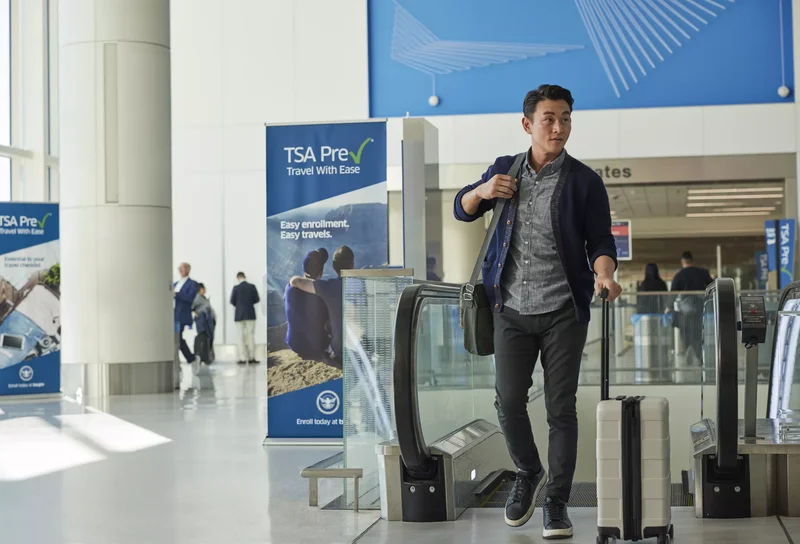There’s a unique kind of dread that settles in at the airport security line. You can almost hear it—the low hum of the X-ray machine, the clatter of plastic bins, the weary shuffle of socked feet on a linoleum floor. It’s a process that feels fundamentally archaic, a one-size-fits-all system of universal suspicion where every traveler, from a seasoned executive to a grandmother visiting her grandkids, is treated as an undifferentiated unit of potential risk. We’ve accepted this friction as the cost of safety.
But what if I told you this entire ritual is becoming a relic? What if the future of security isn't about more intrusive searches, but about something far more elegant: verifiable trust?
This is the quiet revolution happening right under our noses, and its current codename is TSA PreCheck. On the surface, it looks like a simple convenience—a "fast lane" that lets you keep your shoes on and your laptop in your bag. But I don't see a perk; I see a profound paradigm shift. For years, we’ve operated on a model of security that is, frankly, inefficient. It’s a brute-force algorithm that puts every single person through the same high-friction process. TSA PreCheck is the first, tentative step toward a smarter system. It’s a system that says, “What if we could identify low-risk individuals beforehand and create a different, more streamlined path for them?”
This system is built on the concept of a "Known Traveler Number"—in simpler terms, it's a digital handshake that tells the system, 'I've been vetted, you can trust me.' It’s a subtle but powerful change, moving us from a world of anonymous masses to a network of known entities.
The old security model is like a massive, inefficient dragnet, catching everyone in its mesh just to find the few it’s looking for. PreCheck, by contrast, is a finely tuned sensor. It uses data and a pre-enrollment process to create a trusted network. Once you’re in, your boarding pass becomes more than just a ticket; it's a key that unlocks a frictionless experience. For a fee of around $78 for five years—an amount many travel credit cards will reimburse you for anyway—you are essentially buying back your time and your dignity.
When I first started using PreCheck, I was struck by the difference in atmosphere. The regular line is tense, a place of commands and compliance. The PreCheck line is calm. There's a shared understanding, a quiet efficiency that feels… futuristic. In April of 2024, 99% of these passengers waited less than 10 minutes. That statistic isn't just about speed; it's a metric of a system that is working smarter, not harder.

This isn't just about convenience. It’s about re-engineering a process around a new core principle. The fact that you can get this benefit through military service, or by using points from loyalty programs like Marriott Bonvoy or United MileagePlus, shows how this idea of "trusted status" is beginning to permeate different ecosystems. It’s becoming a new kind of currency. But this raises some fascinating questions, doesn't it? For many travelers, the first is simply What Is TSA PreCheck? Requirements, Benefits, More. If we can build a trusted network for air travel, where else can we apply this model? What does it mean for our society when "trustworthiness" becomes a verifiable, digital attribute that can grant us access and streamline our lives?
This is where the story gets truly exciting. The Known Traveler Number is just the beginning. The next evolution is already being tested: TSA PreCheck Touchless ID.
When I first read about this pilot program, which uses facial recognition to verify your identity, I honestly just sat back in my chair, speechless. This is the kind of elegant, human-centered design I've been waiting for. The program allows you to opt-in, and at the security checkpoint, you simply look at a camera. No fumbling for your driver's license, no pulling out your phone for a boarding pass. A quick scan compares your face to your government-held photos, like your passport image, and you’re waved through.
Imagine walking through security without breaking stride, your identity confirmed by a glance, your passage secured not by a document you carry but by the simple, undeniable fact of you—it's a future where the friction of bureaucracy just melts away, replaced by seamless, biometric verification. This is the leap from a system that checks your credentials to one that recognizes your identity. It’s the difference between showing a key card to enter a building and having the door simply open as you approach.
Of course, this power comes with immense responsibility. This isn't a future we should stumble into blindly. How do we ensure this biometric data is protected with the highest levels of security? How do we build these systems to be flawlessly accurate and free from bias, ensuring fairness for every single person? These questions aren't afterthoughts; they must be the bedrock of the systems we build. The integrity of our digital identity is paramount.
This transition feels as significant as the shift from paper ledgers to digital databases. It will feel strange at first, but the gains in efficiency and the potential for a more secure, less burdensome world are simply too massive to ignore. We are watching the prototype for a future where you are your own passport.
Ultimately, TSA PreCheck isn't just a membership program; it's a proof of concept. It proves that we can build systems based on proactive trust rather than reactive suspicion. It demonstrates that by leveraging data and technology thoughtfully, we can design experiences that are both more secure and more human. The real story here isn't about shorter lines at the airport. It's about a fundamental upgrade to the operating system of our society—a shift toward a future where our identity is the key that unlocks a safer, faster, and more seamless world. And we're just getting started.